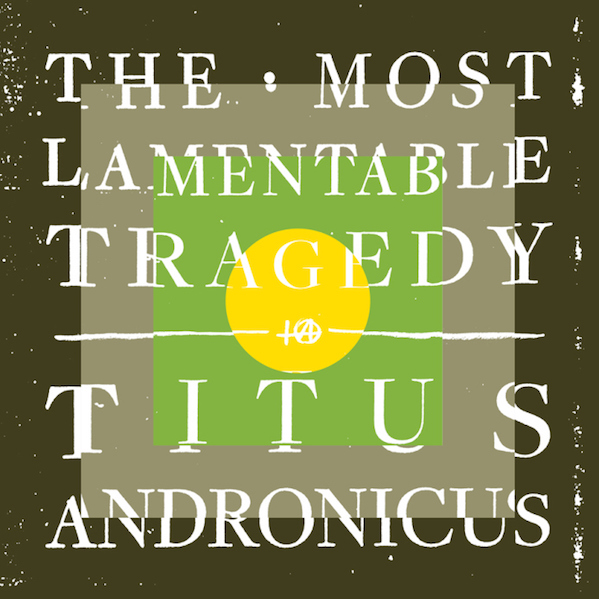Words by Brian Salvatore
To review The Most Lamentable Tragedy, in many ways, is to review Titus Andronicus as a band – this record is as perfect of an encapsulation of the band as you could find. The record is direct, ambitious, meticulously considered, melodic, aggressive, and self referential. In so many ways, this is the logical conclusion of the saga that began with The Airing of Grievances. In fact, much like The Wall, if you played all four Titus Andronicus albums in a row, the end of The Most Lamentable Tragedy, “Stable Boy,” would line up quite well with “Fear and Loathing in Mahwah, NJ,” the first track on The Airing Of Grievances – and that’s because both tracks were recorded on the same cassette deck.
In fact, the overt New Jersey-ness is probably the only Titus Andronicus ingredient that is really not out in full force here, and that’s seemingly because the band has grown beyond its roots, and is practically an intergalactic affair at this point. With string arrangements by Owen Pallett, the songs feel grander than ever before, but the influences are still there. There’s plenty of Springsteen bombast, Stones swagger, and punk rock drive to be found here, with some new touches thrown in as well. Two cover songs – “I Lost My Mind” by Daniel Johnston and “A Pair of Brown Eyes” by the Pogues – bring out the influence of those artists, even though they were always somewhat present. In fact, there are songs that sonically reference those bands, but the covers of both songs are pure Titus Andronicus.
This is a concept record, which is both the most and least important part of the album. The record is about singer Patrick Stickles and his struggle with bipolar disorder, and he makes a record that contains both the manic and the depressive, and both feel stunningly authentic. On top of the emotional resonance, everything about the package is so considered – down to tracks of silence timed out to the second – that you have to take it all in as one giant piece. But unlike so many concept records, most of these songs work removed from context as well. Sure, “Dimed Out” works better as the emotional climax of the first act, especially with the resolution of “More Perfect Union” following it, but it is a great uptempo rocker removed from the album as well. Sure, not everything works perfectly when pulled out, but enough does that, even if you wanted to ignore the concept elements, it still works as a record.
But taken as a record, as a complete thought, the results are so much stronger. Many of the song titles reference past Titus songs, including the next two pieces of the “No Future” series that have graced each of their records thus far. “Mr. E. Mann” is a reference to Local Business‘s “ (I am the) Electric Man;” The Monitor’s “A More Perfect Union” has led to “More Perfect Union.” Every theme, from birth to death to religion to war to mental health, all pop up here. It is no surprise that the title, The Most Lamentable Tragedy, is the subtitle of the Shakespeare play that the band took its name from. This album is the completion of the first act of the Titus Andronicus story – hell, it might even be the last act. Few bands have had careers as perfectly summed up as this – their four studio records tell a complete story, from a garage band writing hooky punk songs, to getting ambitious to the point of (glorious) excess, to pairing the sound back to the essential ingredients, to a final synthesis of their entire catalog. If Titus Andronicus were to end tomorrow, it would feel right.
But imagine where they could go next? There is no longer “No Future” – anything is possible.
‘The Most Lamentable Tragedy’
Merge Records
© July 31st, 2015
www.titusandronicus.net
TheWaster.com | New Jersey
8.8.15



